This little girl is the only one of my ancestors, back to 1800, not born in south Ulster.
It brings to mind another little girl, her great-grandmother, who was born in India about 1794 and married 11 years later.
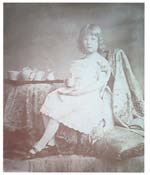
Blayney of Castleblayney
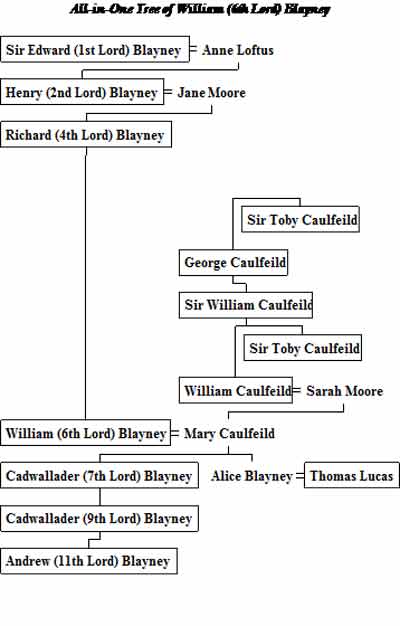
The Blayney family was founded by Edward Blayney. He had served in Spain and in the Lowlands and accompanied the Earl of Essex to Ireland in 1598. He was at the siege of Kinsale in 1601 and became Governor of Mount Norris that year. He was knighted at Dublin Castle in 1603 and became seneschal of County Monaghan in 1604. In 1621 he was named Lord Blayney, Baron of Monaghan.
Sir Edward Blayney and the Elizabethan Wars
from Bardon A History of Ulster:
October 1600
After resting in Newry, Mountjoy advanced towards Armagh, stopping to errect a fort he named Mountnorris eight miles from the city. Tyrone's men attempted to impede the work, as Moryson records:
There began between our Foot and theirs, a very good Skirmish, till our Men did beat them off, and brought with them great Store of Corn and Wood, and killed divers of them. The next Day we bagan to work, in the building of the Fort, and to impeach our work, the Rogues began to skirmish with us on both Sides, which was excellently maintained by some few of our Men, that we sent out: We saw many of them killed, and after understood they lost a great Number, whereof many were Horsemen of the best sort, that had lighted to incourage their men to fight.
Before leaving, Mountjoy put a garrison of four hundred under the command of Captain Edward Blayney.
April 1601
Captain Edward Blayney and Captain Josias Bodley (brother of Sir Thomas, founder of the Bodlian Library) took one of Tyrone's greatest strongholds, the crannog fortress of Lough Lurcan. Moryson records that Bodley,
carrying certain Fire-works provided in case the Boat should fail, went to the Fort, and joining with Captain Blany, marched towards that Island where they arrived by Eight of the Clock in the Morning, and leaving their Forces behind a Wood, they both went together to discover the Island, which done Captain Bodley made ready 30 Arrows with wild-fire, and so they both fell sown with 100 shot close to the Water, where the Shot playing incessantly upon the island, while the other delivered their Arrows, suddenly the Houses fired, and burnt so vehemently, as the Rebels lodging there, forsook the Island, and swam to the further Shoar.
Sir Toby Caulfeild and the Elizabethan Wars
In 1602 Mountjoy did have a good summer's journey. He reached the Blackwater in June and built a new fort, named Charlemont, with a garrison under Sir Toby Caulfeild.
Post plantation;
At Charlemont Sir Toby Caulfield was forced 'every night to lay up all his cattle as it were in warde, doe hee and his what they can, the woolfe and woodkerne (within caliver shot of his forte) have often times a share.
[Gilbert JT A contemporary History of Affairs in Ireland (1641-9) 3 Vols, Dublin, 1879 ; Vol 1 pp 324, 319]
Sir Toby Caulfield reported that a Franciscan friar had preached a seditious sermon to over 1,000 Irish and 14 priests in the woods of Loughinsholin, urging them 'to stand on their keeping and go into plain rebellion.
[Moody, The Londonderry Plantation, 1609-41: The City of London and the Plantation of Ulster, Belfast, 1939] pp 164-6
1641 Rising
Lecky: i (48)
We have, however, some evidence of the nature of the rebellion in another part, in a letter written by the Lords of the Council to the Lord Lieutenant, Oct 25, 1641.
"On Saturday, twelve of the clock at night, Lord Blayney came to town & brought us the ill news of the rebels seizing, with 200 men, his house at Castleblayney, in the County of Monaghan, as also a house of the eArl of Essex, called Carrickmacross with 200 men, & a house of Sir Henry Spotswood in the same county where, there being a little plantation of British they plundered the town and burnt divers houses; & since it appears that they burnt divers other villages, robbed & spoiled many English, & none but Protestants, leaving the English Papists untouched as well.
1641 depositions
from the TCD 1641 depositions
fol. 171r
1029 The right honorable Henrie Lord Blany Baron of Monoghan examined vpon his honor sayth That when the present Rebellion began within the County of Monoghan vizt on or about the xxiijth daie of October last 1641 one Art Roe mc Sr Patrick mc Art Moyle mc Mahone of the Barrony of Trowghe [ ] & Countie aforesaid Esquire with divers other Rebells in his Company by force and armes entered into and tooke the Castle of Monoghan belonging to this Examinant & pillaged his howse Ransacked robbed & dispoyled him the said Lord Blany of his goodes & chattells there & also robbed and ransacked the towne of Monoghan & killed divers English protestants there: & expelled & deprived this Examinant of his Rents due from and out of the Landes of Ballemeaghane Ballecastlane Ballelatlockan, containing in all three Ballybetaghes twoe odd tats alsoe one Ballibetaghe called Balleclounre halfe a Ballibetaghe of Balletolcashell containing eighte tates: Halfe a Bellybetaghe of BallemcEnallowe containing eight tates, and alsoe one Tate called Drumlewny in the Barrony of Dartrie being free land & worth per annum one thowsand one hundreth powndes whereof his Lordship hath already lost one yeres proffitt, & is like to loose the future Rents and proffitts thereof from henceforth vntill a peace be established: & further sayth that by meanes of the Rebellion He the said lord Blany is deprived of & hath Lost in arreares of [lands] Rents due vnto him when the Rebellion began out of the same Landes or some part thereof the sume of ffive hundreth and ffiftie powndes ster And the said Lord Blany further sayth that on or about the said xxiijth daie of October the Rebell Hugh mc 1030 <b> Patrick duff mc Coll mc Mahone Esquire with seuerall other Rebells in his Company rebelliously and forcibly seized on entered and tooke his castle & towne of Castleblany & ransacked robbed & dispoyled the same of the goodes & chattells then and there fownd: & then and there alsoe by force expelled & drove the said Lord Blany from the same same & tooke his Lady seven of his children his [ ] two sisters and many of his kinred servants prisoners & the said Rebells have ever since taken & received the Rents & proffitts of the said Lord Blanyes lands hereafter mencioned which when the Rebellion began were worth one thowsand one hundreth & ffiftie powndes per annum vizt the Rents and proffitts due out of the twoe Ballibetaghes of Ballelurgan and Balleknocklusk three ballibetaghes in the Mannor of Mucknoe called Ballelisdrummaghlis Balledrumacors & Balledrumine fowre tates in the Ballibetaghe of Ballinteane twoe tats in the Ballybetaghe of Ballemcskeaghane and fowre tats of Land in the Ballibetaghe of Ballelackie being all free land, Soe as the said Lord Blany maketh accompt that hee hath Lost not only one yeres proffitt or value there of amounting to one thowsand one hundreth and fiftie pownds as aforesaid & is like to loose the future Rents & proffits thereof vntill a peace be setled But his lordship by meanes of the Rebellion is deprived & hath Lost five hundreth and threescore pownds more arreres of Rent to him due out of the same landes [ ] when the Rebellion began & which is still & due & never like to be paid And further sayth that the Rebells aforenamed and their Complicees and Confederats have alsoe deprived robbed or otherwise dispoyled him the said Lord Blany of his goodes & Chattells Consisting of Horses Mares 1031 Coultes geldinges besids his lordships Ryding horses worth CCxxxvij li. Powndes Beasts and Cattle worth Eight hundreth powndes Plate worth five hundreth powndes Lynen worth five hundreth pownds sheepe worth Cxxv li. more Howshold stuff in his twoe howses worth att least one thowsand markes ready money 296 li. and due debtes 400 li. a library of books 500 li. Besides other goodes & chattells which hee cannott now Remember and the Rebells alsoe have burnt & dispoyled his lordships howses to his damage of 7000 li. But & saith that all his present Losses by meanes of the Rebellion amount vnto that he can for the present Remember amount vnto 13873 li. 13 s. 4 d. at the least and his future Losses that he by the Rebellion is like to susteine by being deprived and stript of the Rents and profitts of his Lands will amount vnto the some of twoe thowsand two hundreth and ffifty powndes per annum vntill a peace be established & that the same landes come to be of their former values He:
Blayney Affirmed vpon his honor xio July 1642 Joh Watson Will Hitchcocke mr Watson Mr Hitchcock 3360 li.-0-00 1032 Monoghan The Lord Blanys Examinacion xio July 1642 Intw Cert fact Hand 29
Testimony of Jane Moore, Lady Blayney, relating to events during the 1641 rising from A History of Monaghan by ES Shirley
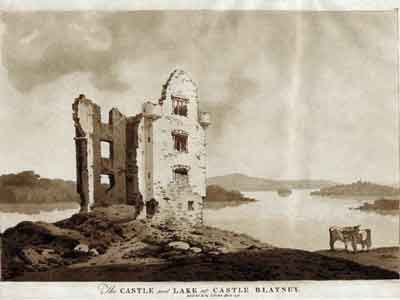
" forty-one, I was taken by the MacMahons and the O'Neals party at my __, from thence I was carried to Carrick McRoss, where I had __ on but turf __ and when the rebels heard that they had missed taking of Dublin, they would not let me stay at Carrick because they thought it was too near my friends, but the next day made me go to Castle-Blayney, and when I came there I found my house plundered. Thus I was kept three days, and then I went to Monaghan where I found that house also plundered. There I was kept some weeks, and one day I was brought into the dining room and bid look out of the window and I should see what fruit the tree bore; there they showed me my cousin Richard Blayney, my Lords cousin german, hanging on a tree, and told me if any of my brothers or my Lord did draw a sword against them, I, and all mine would suffer as my cousin Blayney had: and when the siege of Drogheda was raised, the Irish heard that my own Lord and my brother were with a party abroad seeking to relieve me - then they brought me out of my own house, and put me in a house in the town, and when they had me and my eight children in the house, they locked the door and put fire to the house, it was almost burned down but __ put us out before the house fell: they then carried me to a hill which is near the town and made me see my own house and all the town burn to the ground, they then did take me to Anagagh [in the Parish of Clones] and when they heard the English were come abroad, they then carried me and my children through the bogs and woods from one wood to another, for then they would not let me be two days together in one place, and I had nothing to drink but water out of the puddle, nor had we anything to eat but what we found thrown out. One of my children came to me with joy and told me they had got a sheepskin, and that he had broiled it, and it was very good meat, and brought me some of it to eat, and I and my children did eat very heartily without bread or salt. They would often threaten to kill me and my children, and told me it was no sin to kill me or mine; I had not so much as straw to lie on, nor nothing to drink the puddle water out of most times, but a dirty greasy old hat, and when I was tired with going through the bogs and my feet would stick in them, they would beat me with the butt end of their pikes, and tell me I only loytered till the English came up to me: my daughter Penelope was upon the breast, the nurse would sometimes lag behind, being weary, and then they beat her and take the child and put it on the butt end of their pikes and in one hours time the child fell __ times, which bruised her and broke one of her ribs, of which she died soon after. I was __ months in this sad condition. My friends were all very careful in seeking for me, but no where could be found for to release me, till my brother did seize a monastry in Drogheda, and then he sent for to release me and my company in exchange for them, which __, and there was besides the Nuns an officer that had been taken prisoner and had lost an eye by some accident which the Irish party were very much concerned for, and took my eldest daughter and tyed her in a chair, and resolved to put our her eye, as this man had but one, she must not have two; but when the officer that came with the men declared he would serve them in the same manner without they would forbear that cruelty, at last he prevailed on them to desist.
On my being released there was commissioners sent from King and Parliament to inspect into all the losses of those that suffered in that rebellion and my Lords personal estate was valued at __ and his estate was then set for £2,500 a year which was gone from us.
Some years after [in 1646] my Lord and Lord Donegal, Lord Clanbrasil, Lord Mount Alexander, and Sir Charles Coote, and the Scotts and all their regts went to Benburb to incounter with Owen O'Neale who commanded the Irish army, and here my Lord was killed, Lord Mount Alexander taken prisoner. Many things more happened while I was a prisoner, too tedious here to relate. Capt Wm Cope now in England has heard of this from his father, who was a prisoner with me in all my sufferings, but afterwards we parted. The officer was he that hanged my cousin Blayney whose prisoner I was".
From the trial of Lord Maguire in London
(From Ireland in the Seventeenth Century by Brendan Fitzpatrick)
Lord Henry Blayney's deposition was an honest attempt (if such was possible) to convict Maguire without perjuring himself:
'So near as I can give you the business, it was so long ago. This I can remember, that there was one of the Lords' house, whether it was my lord Fingal or my lord Macary moved it, I cannot certainly depose, but I am sure it was one of them. This occasion was: one of the Earl of Stafford's coachmen said he hoped to see some of the Lords blown up for it [ie Stafford's death]; it was about a fortnight after the Earl of Stafford was beheaded here. Thereupon they got an order for it and so they went down and they did not find the powder, but they made as narrow a search as ever any was. I asked what the meaning was of this, for we had strange censures of it ourselves. Says one of them, the Lord Clanmorris; 'They are afraid of a powder plot of the Protestants.' I answered that I had heard of a powder plot of the papists, but never of the Protestants in my life. But if you ask the reason for it, it was to assure themselves of their strength, for we found by woeful experience of it afterwards it was their end.
Blayney was asked what religion Fingal and Clanmorris were; he replied that Fingal was a Papist and Clanmorris 'a pestiferous papist'.
Blayney, with Sir Francis Hamilton & Sir William Stewart, was suggesting, mostly indirectly, that Lord Maguire was a member of a Parliamentary committee investigating a rumoured plot to blow up the Irish Houses of Parliament and using the occasion to examine the armoury. It wasn't clear that Maguire was a member of the committee.
The overall idea was to connect the alleged plot to blow up parliament with the alleged attempt on the castle and then to unite these with the reality of the Ulster rising.
From the trial of Lord Maguire in London
(From Ireland in the Seventeenth Century by Brendan Fitzpatrick)
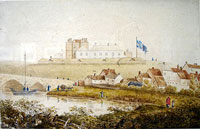
Lady Caulfeild was asked to tell what she knew about the taking of Charlemont [ which had in fact been captured on the evening of 22 Oct, 1641].
The 23rd Oct 1641, Sir Phelim O'Neill and others came into the castle, they seized upon all, murdered servants; and those that were alive they bound them, and put them in prison; and at that time Sir Phelim O'Neill himself and other of his companions, told her that Dublin Castle and city, and most other forts of Ireland were surprised by their confederates the papists; and that he was sorry for his cousin the Lord Maguire, and that he was afraid he was taken.
Serjeant Whitfield asked 'What was done with my Lord Caulfield?'
Lady Caulfield replied: 'He was murdered; he begged for his life and they durst not but do it.'
[In fact Sir Toby lived for several months after the taking of Charlemont.]
Serjeant Whitfield added of his own accord:
'When Sir Phelim O'Neill had taken my lord Caulfield, then they got this lady to write to the Lords Justices, that my lord Maguire might be exchanged for her son, but that would not be; and thereupon they murdered my lord Caulfield, Francis Davis and others.
Battle of Benburb O'Mealan Journal 1646
The general (Eoghan O'Neill) sent three troops with Brian O'Neill, son of Conn Rua to look out for the muster that was on its way from O-Cath-ain country, and despatched a hundred men to Killegevill to meet the enemy and cause confusion among them. That done, they made an honourable retreat to join their own companions.
The General, from the midst of his men, addressed them saying:
'Yonder approaching are the heretics, the enemies of your souls; hold valiantly against them today for it is they who have deprived you of our chiefs, your kin, your spiritual and temporal sustenance. It is they who have seized your lands and banished you, etc,'
The two armies engaged at Drumflugh and the heretics withdrew after a number of them were killed beside their big guns - they had seven field-guns.
The Irish pressed down on them and fire was opened on both sides from both large and small guns. They then used their pikes and heavy-duty swords to piercde and disembowel one another. Into the battle then came that honourable warrior, the magnanimous, valiant soldier and protector of the flock of Pope Innocent X, Eoghan O'Neill. About this time there arrived the three troops who had gone towards Dungannon earlier in the day. The Scots assumed that these were their party. Sir Feilim also joined the battle with a goodly company and a gap a hundred men wide made in the ranks of the enemy, threw them into turmoil. Lord Blaney was killed* and Lord Montgomery captured (considered the leader by O'M) by Cormac O'Neill. Having been deprived of his horse and arms, he was placed in custody. The heretics now gave way and took flight. The Irish gave forth their battle-cry. The General rode before and among his well-ordered army urging them on; the killing continued till the shades of evening and the new night descended. A large number of them was drowned in the Blackwater and in Knocknacloy Lough.
* The body of Lord Blaney was given honourable internment in Benburb church and was later exhumed for internment in the family burying-ground in Castleblaney.
Andrew, 11th Lord Blayney & the United Irish Rising from Lecky
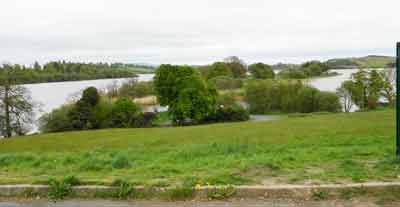
Lord Blayney (Castleblayney), June 2, 1797.
I have received information, wrote Blayney, of several depredations committed by Orange boys; one man murdered, and two badly wounded. They say they are sanctioned by Government, and I am sorry to say, that formerly sufficient notice was not taken of them. Why sanction a mob of any kind? . . . The report is general through the country, that Government protects them. You should not lose a moment in contradicting the assertion. The United business is fast on the decline, so don't revive it, and the scene of civil war and bloodshed which may hereafter ensue by creating distinctions and parties of that nature in the country, may be very dangerous.
Lord Blayney's warnings about the excesses of the Orangemen, and about the reports that the Government were favouring them, were answered by Pelham with the somewhat idle generality, that 'Government did not wish to favour one party more than another, but to do equal justice to all'.
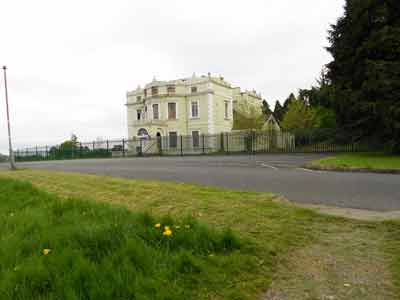
June 10, 1797.
Lord Blayney replied, that the management of this matter required the utmost caution. Orangemen ought certainly to be shown some countenance, but under that cloke robbers and assassins will shelter themselves, and the most conspicuous who countenance them will be held forward as their leaders.
In the same letter he gives an account of his own conduct in burning houses.
In a letter from Castleblayney, on 10th June, he wrote: ". . . It is very fortunate that this troop has been established. The effect it has had is beyond description and more than equal of two thousand men. I have taken vast quantities of arms, pikes etc. and act both in a civil and military capacity, have administered the oath of allegiance and over to security numbers of others by force and a few nights ago at a place called Creggan I was under the necessity of using very harsh measures. My informations there had been very great and from that country proceeds all the disturbances in Louth, Armagh and part of Monaghan adjacent from there up to Forkhill. I had four people to give information but no one dare venture to go into the country for fear of being murdered. I could not go very wrong, so burned several houses, the inhabitants of which were not at home, and I had information of three drills that night, which I could not come at. I burned the house and destroyed the property, to the amount of £800, of a man named Donaldson, the most leading man in this kingdom, and who could not be taken. I should not have proceeded in that manner could it be avoided. The other houses burnt was only the thatch or roofs of some and the damages don't amount to £70, with a view to preventing witnesses being intimidated and to show them if they did not give up their arms quietly what they were to expect. Should it prove that any of those people were innocent, you will have no objection to my making good that loss, it being only for example, and no one dare be seen from that quarter speaking to me. I go on Monday there to make enquiry and administer the oath, &c. in a civil situation. As we shall shortly march from Newry to other counties, I wish you would appoint me a civil magistrate for them. I have totally turned the mob here against united Irishmen and think I can do so there. I found a man the other day attempting to corrupt one of the soldiers. I sent him to be flogged round the town, suppose he received 300 . . ."
In another letter, shortly afterwards, to someone named Glentworth - an army officer perhaps - Lord Blayney wrote: ". . . I have taken prodigious quantities of arms, some voluntarily and others by force. It was very fortunate my undertaking this command. The mode pursued before was folly in the extreme. I am mild and conciliatory with some and very severe with others. I have been out three or four nights out of seven. I have turned as many people in this country against the United system as were for it before and if Government gives me leave I will arm about twelve hundred men, Protestants, and who may be depended on with the arms I shall take from the troublesome . . ."
Links to main Family Index / Lucas of Castleshane
Back to Top